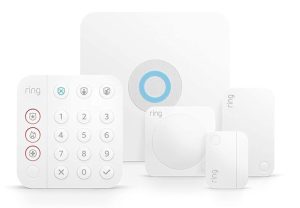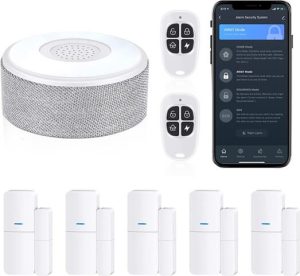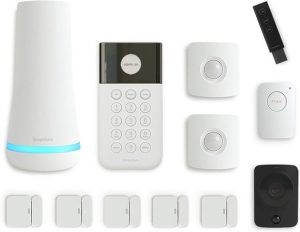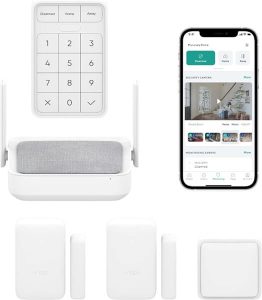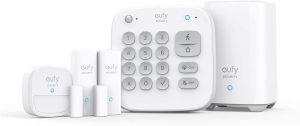Home security services are quite common these days and you can easily find a home security service provider in your region, offering the features and services that you require. However, there are a few limitations of opting for a complete home security package. For starters, these services are usually offered as a complete package and charged accordingly. So, most users end up paying for additional services they do not require.
On top of that, the initial investment for such a service is also a bit expensive as it includes equipment cost as well as installation charges. So, a lot of buyers are looking for alternative solutions these days, such as a DIY home security system. Here are some important factors to keep in mind when you are selecting a DIY home security system.
- Security Modes: Each security system offers a handful of preset options that you can quickly switch between based on how you wish to use your system. These preset options are called security modes and most systems allow you to remotely change the security mode for ease of access. But, you should still consider checking out the options for security modes you are getting before you get your subscription. While most systems offer basic options such as arm and disarm, some advanced options may also include choices like home, away, and other personalized options.
- Equipment: The equipment for a DIY home security system are the devices that make up your DIY home security system, such as sensors, cameras, control panel, mobile app, siren, etc. As you can imagine, these equipment collectively form the security system and the more equipment you get, the more secure your system will be. Also, if advanced equipment such as window sensors or motion sensors are added to your system, it will be more reliable for the long run.
- Smart Home Compatibility: This is basically the ability of your DIY home security system to work with other smart home devices such as lights, locks, cameras, etc using common connectivity protocols such as Zigbee, Z-Wave, or Wi-Fi. Smart home compatibility enhances the overall home automation experience by allowing you to create routines, automate tasks, and even integrate services such as IFTTT for customized smart home networks. But, not all DIY home security systems are compatible with advanced smart home platforms. So, you should check the compatibility before buying.
If you are choosing a DIY home security system, you are indeed going in the right direction as these systems are usually more affordable in terms of initial investments as well as running costs which can increase by a lot in the long run. Also, DIY systems are designed to be simplistic and easier to install so that you can perform the installation yourself quickly without needing any professional help.
But, it is only possible if you are choosing the right home security system based on your needs. As of right now, you will come across a lot of options for a DIY home security system that might confuse you. So, we have handpicked the best options from the most reputed brands on our list today. We will also tell you how you can pick up the best DIY home security system in our “Buying Guide” right after our selection of the best options.
Outline
ToggleBest DIY Home Security Systems Table
| Best DIY Home Security System | Security Modes | Equipment | Smart Home Compatibility | Buy Now |
|---|---|---|---|---|
| Ring DIY Home Security System | Disarmed, Away, and Home | Base station, Keypad, Contact sensor, Motion detector, & Range extender | Alexa | Check On Amazon |
| Tolviviov DIY Home Security System | Away, Disarm, and Home | Alarm siren station, 5 window/door sensors and 2 remote controls | Alexa and Google Assistant | Check On Amazon |
| SimpliSafe DIY Home Security System | Arm, Disarm | Sensors for every room, window and door | Alexa and Google Assistant | Check On Amazon |
| Wyze DIY Home Security System | Arm, Disarm | Power adapter, Entry sensors, Keypad, Motion sensor, Wyze sense hub | Google Home | Check On Amazon |
| eufy DIY Home Security System | Personalized Modes | HomeBase, Keypad, Motion sensor, 2 entry sensors | Alexa | Check On Amazon |
Best DIY Home Security Systems Reviews
1. Ring DIY Home Security System
Ring is one of the leading suppliers right now for a DIY home security service which offers a lot of variety for equipment as well as customized solutions. Unlike most other options, Ring’s offerings are much cheaper than its competitors.
Our 1st choice is the Ring Alarm, a home security system that lets you easily monitor and protect your apartment. It comes with a Base Station, a Keypad, a Contact Sensor, a Motion Detector, and a Range Extender, ensuring you are covered for all your needs with this basic set. With that, you can arm and disarm your Alarm, and even the sensors to detect if any door or window is opened. You can further customize your Ring Alarm Kit by adding more Alarm Sensors and accessories as per your requirements. Furthermore, you can also opt for a Ring Protect Plan to access advanced features and benefits.
With a Ring Protect Plan, you can get mobile notifications when your Alarm is triggered, change your Alarm modes remotely, and monitor all your Ring devices through the Ring mobile app. It also brings the option for professional monitoring, giving you 24/7 emergency response from police, fire, and medical services, as well as backup battery and cellular backup to keep your Ring Alarm online during a power outage. What’s more, you can make your Ring Alarm even smarter with Alexa.
Best Features
- Disarmed, Away, and Home security modes are available
- System includes Base station, Keypad, Contact sensor, Motion detector, & Range extender
- Compatible with Alexa for smart home integration
- Remote access features are very good
Pros
- Most popular choice for DIY smart home service
- Relatively cheaper option than many other choices
- 1-month free trial is available
Cons
- Sensors could have been better
2. Tolviviov DIY Home Security System
tolviviov is also a great brand for security systems, especially when it comes to DIY solutions that you can prefer for a high-performance system. It also offers remote access services at an affordable rate.
In the 2nd position, we are putting the WiFi Door Alarm System by tolviviov which is a highly affordable wireless DIY smart home security system. It comes with an 8-piece kit that includes an alarm siren station, 5 windows & door sensors, and 2 remote controls. You don’t need to sign any contracts or pay any subscription fees to use this system. In fact, you can monitor and manage your home security from your smartphone with the Phone APP Alert without the subscription service. You will also receive instant notifications when any of the sensors are triggered, and you can choose to arm or disarm your system remotely via the app. You can also customize your system by adding more sensors and accessories from tolviviov to cover different areas of your home.
The system supports up to 20 sensors and 5 remote controls/keypads that can be connected to the WiFi alarm station. Setting up the WiFi Door Alarm System is very easy and quick. As it is aimed for DIY installation, you don’t need any tools or wires to install the devices. The system also has a backup battery that works as a backup and lasts for about 8 hours in case of a power outage. The WiFi Door Alarm System is compatible with Alexa and Google Assistant for smart home integration. With that, you can use your voice to control your system with simple commands like Away, Disarm, and Home.
Best Features
- Disarmed, Away, and Home security modes are available
- System includes Alarm siren station, 5 window/door sensors and 2 remote controls
- Compatible with Alexa and Google Assistant for smart home integration
- Suitable for professional installations
Pros
- Great choice for an affordable security solution
- Smart home integration is possible
- Many sensors are included in the set
Cons
- Other options offer more advanced features
3. SimpliSafe DIY Home Security System
While most of the DIY security solutions are aimed for home installations, bands like SimpliSafe makes these options suitable for professional applications as well. There are many different options available from SimpliSafe that you can check out and choose the one that suits your needs.
Our 3rd choice for the best DIY home security system is a highly versatile option from SimpliSafe which you can prefer for personal as well as professional use. Similar to most other options, you can just plug in the Base Station and camera, strategically place your sensors, and you’re ready to protect your home. The SimpliSafe mobile App also guides you through the process to make the installation error-free. If you want, you can first test the system with 1 FREE month of 24/7 professional monitoring, featuring Fast Protect Technology for swift police response.
With optional monitoring services starting at just 66 cents per day, you get to enjoy peace of mind without long-term contracts or hidden fees. Furthermore, you can enhance your security with live video feed, enabling professional monitoring agents to validate break-ins instantly, resulting in priority dispatch. You can also protect all entry points with customizable entry sensors that notify you when someone attempts to access windows, doors, or cabinets. The SimpliSafe motion sensors provide comprehensive room coverage within a 35-foot range, featuring a 90-degree field of view.
Best Features
- Arm, Disarm security modes are available
- System includes Sensors for every room, window and door
- Compatible with Alexa for smart home integration
- Motion sensors have up to 35 feet coverage
Pros
- Great choice for a premium security solution
- Monitoring costs are very low
- It offers 1 month trial period
Cons
- Other options are much more affordable
4. Wyze DIY Home Security System
Wyze is also a brand dedicated to home security solutions which offers a variety of standalone equipment such as cameras, sensors, and central controllers apart from complete packages.
The Wyze Home Security Core Kit, as the name suggests, is a basic home security solution designed to be installed for domestic security and covers core security features with a 5-piece kit. But, even this core kit contains a central Hub, Keypad, Motion Sensor, and two Entry Sensors, offering a robust foundation for safeguarding your home. The included hub is also compatible with Wyze Cam, Leak & Climate Sensors so that you can expand your system later on. The system features 3 months of inclusive 24/7 Professional Monitoring Service with the subscription, ensuring your peace of mind without breaking the bank.
On top of that, it also offers swift and effective 24/7 professional security monitoring, where a text or call from a security agent is dispatched within just 5 seconds of an alarm trigger. In confirmed emergencies, 911 is promptly alerted so that immediate assistance can be claimed. The security and monitoring sensors can be connected wirelessly to the Wyze Sense Hub with a straightforward installation process. As for remote access, the system can be armed or disarmed remotely along with direct access to Wyze Cam feeds.
Best Features
- Disarmed, Arm security modes are available
- System includes Power adapter, Entry sensors, Keypad, Motion sensor, Wyze sense hub
- Compatible with Google Home for smart home integration
- 3 months of 24/7 professional monitoring service available with subscription
Pros
- Very cheap alternative that covers basic security needs
- System supports up to 100 sensors
- Security response is provided within just 5 seconds
Cons
- May not be ideal for large installations
5. eufy DIY Home Security System
Lastly, we are covering yet another great DIY home security solution from eufy. Apart from security system packages, you can also buy standalone equipment from the brand that you can add to your eufy network later on.
Lastly, we are including the eufy Security 5-Piece Home Alarm Kit which is a budget-focused and user-friendly home security system designed to provide robust protection. This comprehensive kit includes a HomeBase, Keypad, Motion Sensor, and two Entry Sensors, ensuring a seamless integration into your home security setup.
So, you can control the entire system conveniently through the eufy Security app, and if desired, link it with eufyCam for enhanced surveillance. The system offers a hassle-free setup that takes just a few minutes, letting you install the system independently. The entry sensors are also easily attached to doors and windows, while the motion sensor and keypad can be securely mounted on walls using the included mounts.
Just like most other DIY solutions, eufy also offers its services without any monthly subscription fees. All of the eufy products are one-time purchases that seamlessly blend security with convenience, making advanced home protection accessible to all. With this system, you can receive instant alerts through the eufy Security app, ensuring you stay informed the moment motion is detected. This real-time notification system also keeps you connected to your home’s security status, providing peace of mind wherever you are.
Best Features
- Personalized security modes are available
- System includes HomeBase, Keypad, Motion sensor, 2 entry sensors
- Compatible with Alexa for smart home integration
- 24/7 protection is possible
Pros
- Overall accessories are pretty good
- No monthly fees is required
- Motion sensitivity can be adjusted
Cons
- Cheaper alternatives are available
Buying Guide For The Best DIY Home Security System
There are many different benefits of choosing a DIY home security system. But most importantly, these systems can provide you with peace of mind and significantly lower your insurance premiums, allowing you to save a lot on the installation and monthly fees compared to a traditional security system.
On top of that, A DIY home security system can also be customized to fit your needs and preferences, and integrated with other smart home devices such as lights, locks, cameras, and thermostats. But, choosing the perfect DIY home security system can be difficult, as there are many factors to consider. Therefore, before you buy a DIY home security system, we will strongly recommend going through our buying guide for the best DIY home security system and see which factors affect the performance of the system in your case.
1. Security Modes
Security modes are the different options available with your system that alter the functionality of the home security system and can alert you and the authorities in case of an emergency. These modes affect various different parameters of the security systems regarding the functionality of motion detectors, sirens, backup modes, and even monitoring services.
For instance, if you are in your home, you can choose to either disarm the system completely or choose a customized home preset that disables services like professional monitoring or sirens. Alternatively, you can also remotely activate or deactivate the system. Usually, users utilize these features when they remotely arm the system or choose the maximum security preset if they are not going to return for a few days or weeks at a time. So, you should choose a DIY home security system that offers the security modes that suit your needs and preferences.
2. Equipment
Equipment are the devices that basically make up your DIY home security system, such as sensors, cameras, control panel, mobile app, siren, etc. As you can imagine, lesse equipment means an incomplete security system as there are chances of loopholes in your system. Also, the system should allow addition of equipment later on so that users can add additional accessories to the system as per their requirement.
This significantly reduces the initial investment and lets you customize your system as you want. So, it is crucial to carefully check the count and type of equipment that you are getting with your DIY home security system. For example, if you have a large home, you may need more sensors and cameras than a small home. If you have pets, you may need cameras that have pet detection features to avoid false alarms.
3. Smart Home Compatibility
When you are looking for a DIY security system, checking its compatibility with popular smart home platforms like Amazon Alexa, Google Assistant, or Apple HomeKit should be your top priority. It ensures a unified smart home experience as you will be able to control your smart system directly using other smart devices if they share a common smart home network. This integration also allows you to monitor your security system alongside other smart devices, which creates a seamless and interconnected ecosystem. But, make sure to check the compatibility list beforehand to confirm that your preferred devices work seamlessly with your chosen DIY security system. For instance, there are only a handful of DIY security systems that are compatible with advanced smart home services such as Apple HomeKit. But, the majority of options these days are compatible with popular smart home networks such as Alexa or Google Home.
4. Resolution
Security cameras are not one of the most crucial aspects of a home security system and when it comes to cameras, there are only a few qualities that matter the most. The resolution of the camera is one such property alongside other features such as frame rate and coverage area. Resolution is generally the most important of all when it comes to security cameras. A higher resolution, such as 1080p or 4K ensures clearer and more detailed images. This is particularly crucial for facial recognition and identifying potential threats upon reviewing the surveillance footage. So, it’s recommended to invest in cameras with night vision capabilities to maintain image quality in low-light conditions, providing comprehensive surveillance around the clock.
5. Motion Detection
Motion detection is the feature that allows your system to detect and record any movement in your home. It helps you save storage space and battery life, as your cameras will only record when there is something happening, rest of the time the cameras can either be idle or record based on your system’s configuration. Motion detection also triggers alerts and notifications, so you can be aware of any suspicious activity around your home or doorstep. So, you should choose a DIY home security system that offers motion detection that suits your needs and preferences. For example, if you want to avoid false alarms, you would want to go with a system that has advanced motion detection features, such as person detection, pet detection, customizable activity zones, etc. These features help you filter out irrelevant motion triggers and avoid false alarms altogether. You should also consider the sensitivity and range of the motion detection, as some systems may be more or less responsive than others.
6. Monitoring Type and Its Plans
Monitoring type is the way that your system communicates with you and the authorities in case of an emergency. There are two main types of monitoring: self-monitoring and professional monitoring.
-
Self Monitoring
This means that you are responsible for monitoring your system and responding to any alerts or notifications. You can use your mobile app or web portal to view live video feeds, check the status of your sensors, arm or disarm your system, etc. You can also contact the authorities yourself if you need help. Self-monitoring is usually free or low-cost, but it requires more attention and responsibility from you.
-
Professional Monitoring
As the name suggests, professional monitoring connects your system to a dedicated monitoring center staffed by trained operators who will monitor your system and respond to any alerts or notifications. They will also contact you as well as the authorities if they detect any emergency situation in your home. Professional monitoring is usually more reliable and convenient, but it requires a monthly fee and a contract.
7. Remote Control & Mobile App Connectivity
Remote control and mobile app connectivity are the accessibility features that allow you to access and control your system from anywhere using your smartphone. Sometimes, the services also offer access via a WebPortal which can be accessed with any device using a simple internet browser. As you can imagine, having these enhanced accessibility features makes the system a lot more convenient and increases the functionality of your system. Using remote control, you can often update system parameters and perform functions like:
- View live video feeds
- Check the status of your sensors
- Arm or disarm your system
- Receive alerts and notifications, etc.
8. Power Source
Checking the power source of your security system is very important, especially since you are getting a DIY security system. The power source of the system does not only affect its performance, but also installation options and additional changes needed at the time of installation. There are two main types of power sources that are battery-powered and wired. Battery-powered DIY systems include equipment that are powered by either a rechargeable battery, or an replaceable battery.
In comparison, these systems are very easy to install and more flexible, as you can place them anywhere without worrying about wires or outlets. But, battery-powered systems also have a shorter battery life and lower performance, depending on the usage and weather conditions. On the other hand, wired systems are usually more reliable and consistent, as they do not depend on batteries. But while installing such a system, there may be additional challenges to ensure proper connectivity.
9. Connectivity
When it comes to a security system, you also need to check the available connectivity options to ensure whether the system will work with your network or not. Generally, all wireless security systems are Wi-Fi-enabled so that they offer convenience in terms of installation and remote access. However, it also means that the cameras and other connected devices are dependent on the network, making it vulnerable to network outages. ALternatively, you can find cellular connectivity as a backup to provide more reliable connections, especially in areas prone to internet disruptions. As the cellular connection works similarly as the SIM card in your smartphone, there are additional charges related to the cellular network. But, these charges are usually covered within the subscription costs for most of the systems.
10. Warranty
The warranty provided by the manufacturer is a crucial aspect and you should definitely base your decision on the available warranty period if you are investing a large sum in the security system. A more extended warranty period indicates the manufacturer’s confidence in the product’s durability as well as its performance. So, you can rely on such systems and get free of cost repair or replacement services from the manufacturer if something goes wrong. But, make sure you carefully review the terms and conditions of the warranty to understand the coverage offered by the manufacturer. A comprehensive warranty also ensures that you can rely on the system for an extended period with the assurance that any potential issues will be addressed.
Best DIY Home Security System: FAQs
Ans: The effectiveness of any security system depends on various factors such as the included equipment, surrounding environment, and usage statistics. DIY systems are often preferred for their ease of installation and affordability. They can empower homeowners to customize their security setup as much as they want. Whereas, traditional systems are usually installed by professionals, and offer some advanced features and integration. This makes them suitable for larger or more complex installations.
Ans: Generally, DIY security systems are more cost-effective compared to traditional options. DIY options eliminate the need for installation fees and also allow homeowners to select and install the components themselves. However, the overall cost depends on the chosen system, the number of devices required, and any additional features that you would want in your system. Traditional systems may incur higher upfront costs due to professional installation and as a fee for a complete package, but it usually offers more advanced features that might be costlier if you decide to add those into a DIY setup.
Ans: Yes, DIY security systems are designed to be user-friendly, allowing homeowners to install and set up the system without professional assistance. The kit itself includes step-by-step instructions for installation along with the accessories that you will need for the complete installation and setup procedure. Furthermore, the components and accessories of these systems are designed for easy installation so that minimal effort is required at each step. Wireless connectivity options have further simplified the process, eliminating the need for complex wiring outside your home. While professional installation might be necessary for some traditional systems, DIY options cater to those who prefer a more hands-on approach and want to save on installation costs.
Ans: The durability of a home security system depends on the quality of the components included in the system and how well they are maintained. Both DIY and traditional systems can have long lifespans if properly installed and proper maintenance is carried out. DIY systems often use wireless technology, which can be just as reliable as wired options when it comes to longevity. However, traditional systems are benefitted from professional installation, ensuring all components are set up by a professional. But ultimately, the lifespan of a security system is influenced by factors such as the brand’s reputation, the quality of components, and regular maintenance, rather than whether it’s DIY or professionally installed.
Conclusion
Choosing the right DIY home security system is a crucial decision that involves considering various factors to ensure optimal security for your home. So when you’re looking for one, make sure you check out some of the important aspects of the system such as the security modes, including equipment, smart home compatibility, motion detection, monitoring type,etc to make sure that you are making the right choice. You can find more information about these aspects in our buying guide for the best DIY home security system. Apart from that, we have also brought you the best options available in the industry right now for a DIY home security system. We have carefully picked up these options based on their popularity and average user feedback which is a great testimony for their performance and reliability. If you are not sure which of these options are best suited for your needs, you can choose any of the options from our top recommendations presented here.
- Ring DIY Home Security System is one of the few names in the market which has solely developed a reputation by offering DIY home security solutions. The package covered in this guide is the Ring Alarm – home security system which is a 5 piece security solution. The kit contains a base station, a keypad, a contact sensor, and also a motion detector. And if you decide to get the Ring Protect plan, you will be able to take advantage of remote connectivity options along with notifications and alerts sent directly to your smartphone.
- On the other hand, there are also a handful of premium DIY security system providers such as SimpliSafe DIY Home Security System that makes them a viable choice for professional setups. The SimpliSafe Wireless Home Security system included in this guide offers 12 units in the package that can cover each and every aspect of the security for your home or office. And despite offering a dedicated professional monitoring service, SimpliSafe keeps the system completely free from any contract, letting you change or upgrade your security provider whenever you want. You can also test the system with a trial period so that you can understand the system completely before investing in it.
- Lastly, we will suggest going with the Wyze DIY Home Security System if you’re looking for a budget-alternative to DIY home security solutions. This is a relatively simpler setup that consists of a central hub, a keypad, motion sensor, and entry sensors. If you want, you can pair the system with Wyze security cameras later on and expand the security and surveillance capability of the system. As all of the included accessories and plug-and-play, you simply need to place the units in their position and you are done with the installation. And with its mobile companion app, you can also arm/disarm the system remotely or watch live feed from the connected cameras. As for the expansion, this small system can be expanded to include more than 100 sensors, making it a highly future-proof option.

